|
|
|
Sort Order |
|
|
|
Items / Page
|
|
|
|
|
|
|
| Srl | Item |
| 1 |
ID:
162225
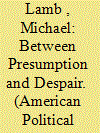

|
|
|
|
|
| Summary/Abstract |
Many political theorists dismiss Augustine as a pessimist about politics, assuming his “otherworldly” account of love precludes hope for this-worldly politics. This article challenges this pessimism by applying recent research on Augustine's “order of love” to reconstruct his implicit order of hope. Analyzing neglected sermons, letters, and treatises, I argue that Augustine encourages hope for temporal goods as long as that hope is rightly ordered and avoids the corresponding vices of presumption and despair. I then identify “civic peace” as a common object of hope that diverse citizens can share. By recovering hope as a virtue and reframing civic peace as a positive form of civic friendship, I argue that Augustine commends a hope for the commonwealth that avoids both presumption and despair. I conclude by analyzing how Augustine's vision of the commonwealth can inform contemporary political theory and practice.
|
|
|
|
|
|
|
|
|
|
|
|
|
|
|
|
| 2 |
ID:
162220


|
|
|
|
|
| Summary/Abstract |
We argue that short government durations in parliamentary democracies increase public spending by driving a political budget cycle. We present a revision of the standard political budget cycle model that relaxes the common (often implicit) assumption that election timing is fixed and known in advance. Instead, we allow cabinets to form expectations about their durability and use these expectations to inform their spending choices. The model predicts that (1) cabinets should spend more as their expected term in office draws to a close and (2) cabinets that outlive their expected duration should run higher deficits. Using data from 15 European democracies over several decades, we show that governments increase spending as their expected duration withers and run higher deficits as they surpass their forecasted life expectancy.
|
|
|
|
|
|
|
|
|
|
|
|
|
|
|
|
| 3 |
ID:
162223


|
|
|
|
|
| Summary/Abstract |
Recent empirical evidence suggests an ambiguous relationship between internal conflicts, state capacity, and tax performance. In theory, internal conflict should create strong incentives for governments to develop the fiscal capacity necessary to defeat rivals. We argue that one reason that this does not occur is because internal conflict enables groups with de facto power to capture local fiscal and property rights institutions. We test this mechanism in Colombia using data on tax performance and property rights institutions at the municipal level. Municipalities affected by internal conflict have tax institutions consistent with the preferences of the parties dominating local violence. Those suffering more right-wing violence feature more land formalization and higher property tax revenues. Municipalities with substantial left-wing guerrilla violence collect less tax revenue and witness less land formalization. Our findings provide systematic evidence that internal armed conflict helps interest groups capture municipal institutions for their own private benefit, impeding state-building.
|
|
|
|
|
|
|
|
|
|
|
|
|
|
|
|
| 4 |
ID:
162226


|
|
|
|
|
| Summary/Abstract |
Hitler’s rise to power amidst an unprecedented propaganda campaign initiated scholarly interest in campaign effects. To the surprise of many, empirical studies often found minimal effects. The predominant focus of early work was on U.S. elections, though. Nazi propaganda as the archetypal and, in many ways, most likely case for strong effects has rarely been studied. We collect extensive data about Hitler’s speeches and gauge their impact on voter support at five national elections preceding the dictatorship. We use a semi-parametric difference-in-differences approach to estimate effects in the face of potential confounding due to the deliberate scheduling of events. Our findings suggest that Hitler’s speeches, while rationally targeted, had a negligible impact on the Nazis’ electoral fortunes. Only the 1932 presidential runoff, an election preceded by an extraordinarily short, intense, and one-sided campaign, yielded positive effects. This study questions the importance of charismatic leaders for the success of populist movements.
|
|
|
|
|
|
|
|
|
|
|
|
|
|
|
|
| 5 |
ID:
162207


|
|
|
|
|
| Summary/Abstract |
It is well-established that in diverse societies, certain groups prefer to exclude other groups from power and often from society entirely. Yet as many societies are diversifying at an increasingly rapid pace, the need for cross-group cooperation to solve collective action problems has intensified. Do preferences for exclusion inhibit the ability of individuals to cooperate and, therefore, diminish the ability for societies to collectively provide public goods? Turning to Israel, a society with multiple overlapping and politically salient cleavages, we use a large-scale lab-in-the-field design to investigate how preferences for exclusion among the Jewish majority predict discriminatory behavior toward Palestinian Citizens of Israel. We establish that preferences for exclusion are likely symbolic attitudes, and therefore stable and dominating of other attitudes; are held especially strongly by low-status majority group members; and powerfully predict costly non-cooperation. This preferences/behavior relationship appears unaffected by mitigating factors proposed in the intergroup relations literature. The demonstrated influence of symbolic attitudes on behavior calls for further examination of the social roots of exclusionary preferences.
|
|
|
|
|
|
|
|
|
|
|
|
|
|
|
|
| 6 |
ID:
162209


|
|
|
|
|
| Summary/Abstract |
Conventional models of clientelism often assume poor voters have little or no choice over which local broker to turn to for help. Yet communities in many clientelistic settings are marked by multiple brokers who compete for a following. Such competition makes client choices, and the preferences guiding such choices, pivotal in fueling broker support. We examine client preferences for a pervasive broker—slum leaders—in the context of urban India. To identify resident preferences for slum leaders, we conducted an ethnographically informed conjoint survey experiment with 2,199 residents across 110 slums in two Indian cities. Contra standard emphases on shared ethnicity, we find residents place heaviest weight on a broker's capability to make claims on the state. A survey of 629 slum leaders finds client-preferred traits distinguish brokers from residents. In highlighting processes of broker selection, and the client preferences that undergird them, we underscore the centrality of clients in shaping local brokerage environments.
|
|
|
|
|
|
|
|
|
|
|
|
|
|
|
|
| 7 |
ID:
162210


|
|
|
|
|
| Summary/Abstract |
Interest groups contribute much less to campaigns than legally allowed. Consequently, prevailing theories infer these contributions must yield minimal returns. I argue constraints on PAC fundraising may also explain why interest groups give little. I illuminate one such constraint: access-seeking PACs rely on voluntary donations from affiliated individuals (e.g., employees), and these PACs alienate donors with partisan preferences when giving to the opposite party. First, difference-in-differences analysis of real giving shows donors withhold donations to access-seeking PACs when PACs contribute to out-partisan politicians. Next, an original survey of corporate PAC donors demonstrates they know how their PACs allocate contributions across parties, and replicates the observational study in an experiment. Donors’ partisanship thus limits access-seeking PACs’ fundraising and influence. This provides a new perspective on why there is little interest group money in elections, and has broad implications for how partisan preferences and other internal constraints shape interest group strategy.
|
|
|
|
|
|
|
|
|
|
|
|
|
|
|
|
| 8 |
ID:
162227


|
|
|
|
|
| Summary/Abstract |
Repeated measurements of the same countries, people, or groups over time are vital to many fields of political science. These measurements, sometimes called time-series cross-sectional (TSCS) data, allow researchers to estimate a broad set of causal quantities, including contemporaneous effects and direct effects of lagged treatments. Unfortunately, popular methods for TSCS data can only produce valid inferences for lagged effects under some strong assumptions. In this paper, we use potential outcomes to define causal quantities of interest in these settings and clarify how standard models like the autoregressive distributed lag model can produce biased estimates of these quantities due to post-treatment conditioning. We then describe two estimation strategies that avoid these post-treatment biases—inverse probability weighting and structural nested mean models—and show via simulations that they can outperform standard approaches in small sample settings. We illustrate these methods in a study of how welfare spending affects terrorism.
|
|
|
|
|
|
|
|
|
|
|
|
|
|
|
|
| 9 |
ID:
162214


|
|
|
|
|
| Summary/Abstract |
Group members value informed decisions and hold ideological preferences. A leader takes a decision on their behalf. Good leadership depends on characteristics of moderation and judgment. The latter emerges (endogenously) via advice communicated by “trustworthy associates.” Trustworthy advice requires ideological proximity to the leader. A group may choose a relatively extreme leader with a large number of such associates. Paradoxically, this can happen though it is in the group’s collective interest to choose a moderate leader. To assess whether these insights persist when political groups compete, we embed our analysis in a model of elections. Each of two parties chooses a leader who implements her preferred policy if elected. We find that a party may choose an extreme leader who defeats a moderate candidate chosen by the opposing party. Our results highlight the importance of party cohesion and the relations between a leader and her party. These can be more important to electoral success than proximity of a leader’s position to the median voter.
|
|
|
|
|
|
|
|
|
|
|
|
|
|
|
|
| 10 |
ID:
162221
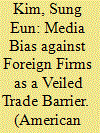

|
|
|
|
|
| Summary/Abstract |
While the rules of international trade regimes prevent governments from employing protectionist instruments, governments continue to seek out veiled means of supporting their national industries. This article argues that the news media can serve as one channel for governments to favor domestic industries. Focusing on media coverage of auto recalls in China, I reveal a systematic bias against foreign automakers in those newspapers under strict government control. I further analyze subnational reporting patterns, exploiting variation in the level of regional government interest in the automobile industry. The analysis suggests that the media’s home bias is driven by the government’s protectionist interests but rules out the alternative hypothesis that home bias simply reflects the nationalist sentiment of readers. I show that this home bias in news coverage has meaningful impact on actual consumer behavior, combining automobile sales data and information on recall-related web searches.
|
|
|
|
|
|
|
|
|
|
|
|
|
|
|
|
| 11 |
ID:
162222


|
|
|
|
|
| Summary/Abstract |
The paper uses a unique hand-collected dataset of the prices at which the Spanish Crown sold colonial provincial governorships in seventeenth and eighteenth century Peru to examine the impact of colonial officials on long-run development. Combining provincial characteristics with exogenous variation in appointment criteria due to the timing of European wars, I first show that provinces with greater extraction potential tended to fetch higher prices and attract worse buyers. In the long run, these high-priced provinces have lower household consumption, schooling, and public good provision. The type of governors ruling these provinces likely exacerbated political conflict, ethnic segregation, and undermined institutional trust among the population.
|
|
|
|
|
|
|
|
|
|
|
|
|
|
|
|
| 12 |
ID:
162215


|
|
|
|
|
| Summary/Abstract |
We test whether politicians’ communications shape their supporters’ policy priorities by conducting a field experiment in collaboration with several local elected officials. In the experiment, the officials sent out email messages to the constituents on their distribution lists. Half the constituents received messages where the official advocated for the priority of a given issue, while the other half received a placebo email. We surveyed the constituents one to two months before the message went out and again the week after the official sent the message. The experiment shows that politicians did not change citizens’ priorities in the desired direction. Moreover, citizens who received a message where the official indicated the issue was a priority were not more likely to act when invited to sign a petition on the issue. Elected officials’ ability to shape the priorities of the politically active citizens with whom they regularly communicate is limited and can even be self-defeating.
|
|
|
|
|
|
|
|
|
|
|
|
|
|
|
|
| 13 |
ID:
162211
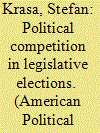

|
|
|
|
|
| Summary/Abstract |
We develop a theory of electoral competition in multidistrict legislative elections when nomination decisions are made by local policy-motivated party members, and voters care about both local and national positions. We show that the asymmetry generated by different national party positions reduces or even entirely removes the competitive pressure to nominate moderate candidates. The model has important implications for our understanding of policy divergence and, in particular, of the effects of gerrymandering.
|
|
|
|
|
|
|
|
|
|
|
|
|
|
|
|
| 14 |
ID:
162212
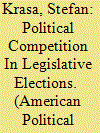

|
|
|
|
|
| Summary/Abstract |
We develop a theory of electoral competition in multidistrict legislative elections when nomination decisions are made by local policy-motivated party members, and voters care about both local and national positions. We show that the asymmetry generated by different national party positions reduces or even entirely removes the competitive pressure to nominate moderate candidates. The model has important implications for our understanding of policy divergence and, in particular, of the effects of gerrymandering.
|
|
|
|
|
|
|
|
|
|
|
|
|
|
|
|
| 15 |
ID:
162217


|
|
|
|
|
| Summary/Abstract |
Recent years have witnessed growing controversy over the “wisdom of the multitude.” As epistemic critics drawing on vast empirical evidence have cast doubt on the political competence of ordinary citizens, epistemic democrats have offered a defense of democracy grounded largely in analogies and formal results. So far, I argue, the critics have been more convincing. Nevertheless, democracy can be defended on instrumental grounds, and this article demonstrates an alternative approach. Instead of implausibly upholding the epistemic reliability of average voters, I observe that competitive elections, universal suffrage, and discretionary state power disable certain potent mechanisms of elite entrenchment. By reserving particular forms of power for the multitude of ordinary citizens, they make democratic states more resistant to dangerous forms of capture than non-democratic alternatives. My approach thus offers a robust defense of electoral democracy, yet cautions against expecting too much from it—motivating a thicker conception of democracy, writ large.
|
|
|
|
|
|
|
|
|
|
|
|
|
|
|
|
| 16 |
ID:
162213


|
|
|
|
|
| Summary/Abstract |
Do primary elections cause candidates to take extreme, polarized positions? Standard equilibrium analysis predicts full convergence to the median voter’s position with complete information, but behavioral game theory predicts divergence when players are policy-motivated and have out-of-equilibrium beliefs. Theoretically, I show that primary elections can cause greater extremism or moderation, depending on the beliefs candidates and voters have about their opponents. In a controlled incentivized experiment, I find that candidates diverge substantially and that primaries have little effect on average positions. Voters employ a strategy that weeds out candidates who are either too moderate or too extreme, which enhances ideological purity without increasing divergence. The analysis highlights the importance of behavioral assumptions in understanding the effects of electoral institutions.
|
|
|
|
|
|
|
|
|
|
|
|
|
|
|
|
| 17 |
ID:
162224


|
|
|
|
|
| Summary/Abstract |
We study dynamic international agreements when one of the negotiating parties faces a threat of electoral replacement during negotiations, when agreements made before the election are the starting point for any subsequent renegotiation, and when governments cannot commit to future negotiation strategies. Conflicts of interest between governments may be softened or intensified by the governments’ conflicts of interest with voters. We characterize when the threat of electoral turnover strengthens the prospect for successful negotiations, when it may cause negotiations to fail, and how it affects the division of the surplus from cooperation. We also show how changes in domestic politics—including uncertainty about the preferences of domestic political parties—affect a domestic government’s ability to extract greater concessions in negotiations.
|
|
|
|
|
|
|
|
|
|
|
|
|
|
|
|
| 18 |
ID:
162218


|
|
|
|
|
| Summary/Abstract |
Workers face a common dilemma when exercising their right to strike. For the worst-off workers to go on strike with some reasonable chance of success, they must use coercive strike tactics like mass pickets and sit-downs. These tactics violate some basic liberties, such as contract, association, and private property, and the laws that protect those liberties. Which has priority, the right to strike or the basic liberties strikers might violate? The answer depends on why the right to strike is justified. In contrast to liberal and social democratic arguments, on the radical view defended here, the right to strike is a right to resist oppression. This oppression is partly a product of the legal protection of basic economic liberties, which explains why the right to strike has priority over these liberties. The radical view thus best explains why workers may use some coercive, even lawbreaking, strike tactics.
|
|
|
|
|
|
|
|
|
|
|
|
|
|
|
|
| 19 |
ID:
162219


|
|
|
|
|
| Summary/Abstract |
Can technological change contribute to political turnover? Influential theories suggest that technological change represents a form of creative destruction that can weaken incumbents and strengthen outsiders, leading to political turnover. This paper investigates a large-scale historical natural experiment: the impact of the green revolution on single-party dominance in India. Drawing on a theoretical framework based on models of contests, this paper argues that high-yielding variety (HYV) crops strengthened the incentives and capacity of a politically excluded group, in this case agricultural producers, to seek greater political representation. Exploiting the timing of the introduction of HYV crops, together with district-level variation in suitability for the new crop technology, instrumental variables analyses show that the green revolution played a pivotal role in the rise of agrarian opposition parties and decline of single-party dominance. The findings support theories linking technological change to political turnover, with important implications for the political economy of democratization.
|
|
|
|
|
|
|
|
|
|
|
|
|
|
|
|
| 20 |
ID:
162206
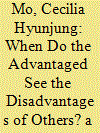

|
|
|
|
|
| Summary/Abstract |
Are there mechanisms by which the advantaged can see the perspectives of the disadvantaged? If advantaged individuals have prolonged engagement with disadvantaged populations and confront issues of inequality through national service, do they see the world more through the lens of the poor? We explore this question by examining Teach For America (TFA), as TFA is a prominent national service program that integrates top college graduates into low-income communities for two years and employs a selection model that allows for causal inference. A regression discontinuity approach, utilizing an original survey of over 32,000 TFA applicants and TFA’s selection data for the 2007–2015 application cycles, reveals that extended intergroup contact in a service context causes advantaged Americans to adopt beliefs that are closer to those of disadvantaged Americans. These findings have broad implications for our understanding of the impact of intergroup contact on perceptions of social justice and prejudice reduction.
|
|
|
|
|
|
|
|
|
|
|
|
|
|
|
|
|
|
|
|
|